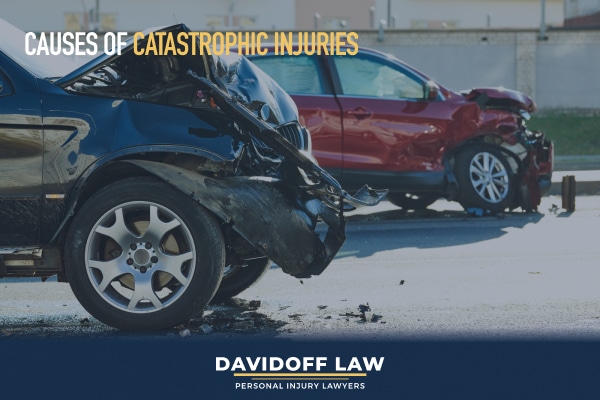
Not all injuries are created equal. If you are involved in an accident, you could suffer a catastrophic injury. These injuries can lead to major medical expenses and hinder your ability to earn an income for the rest of your life.
When that happens, you should meet with our Bronx catastrophic injury lawyers to see if we can file a personal injury lawsuit.
We are Davidoff Law and have seen all types of personal injury cases. We can help you after a car accident, workplace accident, truck crash, or slip-and-fall.
Our personal injury attorneys are here to fight for justice on your behalf. Learn more about catastrophic injuries below. Then, contact a personal injury attorney from our firm to discuss your personal injury case.
Table of Contents
OUR NY PERSONAL INJURY LAWYER IS HERE WHEN THE INSURANCE COMPANY ISN'T

If you are catastrophically injured in an accident, you will need as much support as you can get to get back on your feet, metaphorically and literally.
However, the insurance company representing the party that caused your injury won't be so eager to lend a hand. It will know that your recovery costs can be significant, so it will do everything to avoid paying them.
Davidoff Law and our Bronx catastrophic injury attorneys have built our careers on fighting insurance companies in important cases.
When you are feeling out of luck because an insurance company isn't taking your catastrophic injury case seriously, we hope you grab the phone and dial 212-900-0000. Our team is always ready to hear from new and returning clients in difficult situations like yours.
With us leading the way, you can get all the compensation owed to you! Our personal injury lawyers are proud to offer a free consultation.
TYPES OF CATASTROPHIC INJURIES
A catastrophic injury can take many forms. The underlying connection among all the forms is that the injury is life-threatening or life-changing.
Our firm focuses on catastrophic injury cases like yours because we have the experience, resources, and knowledge necessary to challenge major insurance corporations that try to disrespect and deny such claims.
Examples of catastrophic injury cases we can handle include:
- Traumatic brain injuries. A traumatic brain injury (TBI) is life-changing in all situations. A slight amount of harm to the brain can cause massive health disruptions and day-to-day complications, depending on what part of the brain is injured. Many people with a TBI have memory loss issues, speech impediments, learning difficulties, and so on. Various therapies are often required to alleviate some of the worst symptoms.
- Spinal cord injuries. The spinal cord is a bundle of nerves highly susceptible to harm. Damage to the spinal cord can cause numbness, chronic pain, and, in the worst cases, paralysis. The extent of the paralysis will depend on what part of the spinal cord was injured. If it is injured near the neck or along the cervical spine, the injury can cause quadriplegia or full-body paralysis, which is usually incurable. As with a TBI, spinal cord injury cases are typically accompanied by extensive and lifelong physical therapy sessions.
- Third-degree burns. Burn injuries are categorized into degrees of severity. Third-degree burns can cause permanent scarring and life-threatening complications, so they are considered catastrophic injuries. Second-degree burns are serious enough to warrant a personal injury claim. Still, they are typically not considered catastrophic unless the scarring is in a visible area like the face, neck, or forearms. Severe burn injuries are not unusual in accident victims.
- Amputations. Losing a limb in an accident is immediately life-changing. Modern prosthetics have made life much easier for amputees than in the past, but the pain and hardships caused by the injury cannot be overlooked. If you lost an arm, leg, hand, foot, or fingers in an accident, then you should consider filing a lawsuit against the party that caused it.
- Sensory injuries. Blindness and deafness are two forms of catastrophic sensory injury due to their permanency and severity. Just the challenge of readjusting to a life without sight or hearing can cause significant mental anguish and emotional trauma, which should be calculated into any compensation you collect from the liable party's insurer.
Causes of Catastrophic Injuries

Severe Car Crashes
High-speed collisions or rollovers in cars can lead to life-changing injuries. These car accidents can cause brain injuries, spinal cord damage, or loss of limbs. It's vital to always drive safely and wear seatbelts.
Industrial Accidents
Working with heavy machinery or in dangerous conditions can result in catastrophic injuries. Employers must ensure safe working environments and provide proper training to prevent such accidents.
Sports Injuries
High-impact sports or extreme activities can cause severe injuries if safety gear isn't used or rules aren't followed. Participants should always use appropriate protective equipment and play safely.
Falls from Height
Falling from a ladder, roof, or high place can cause serious injuries. Using safety equipment and following safety protocols can help prevent these accidents. Always be cautious when working or standing at heights.
Medical Malpractice
Sometimes, mistakes made by healthcare professionals can result in severe harm. This might include surgical errors or wrong diagnoses. Patients need to receive proper care to avoid such outcomes.
What To Do After a Catastrophic Injury
- Call for emergency help. If you or someone else has sustained a catastrophic injury, call 911 immediately. Getting prompt medical attention is critical.
- Don't move the injured person. Unless it's necessary, don't move someone who's badly injured. Wait for medical professionals to arrive.
- Report the incident. If the injury occurred due to an accident, report it to the authorities. This is important for documentation and legal purposes.
- Gather information and evidence. Collect any information about how the injury occurred, along with photos or contact information from witnesses.
- Notify insurance providers. Contact your insurance company to report the injury. Follow their instructions when submitting any necessary claims.
- Keep detailed records. Keep records of all medical treatments, expenses, and communications related to the injury. This documentation is essential for insurance claims and legal actions.
- Seek legal counsel. After a catastrophic injury, consult a lawyer who is experienced in handling such cases. They can provide valuable advice and support through the legal process.
EXTENSIVE MEDICAL TREATMENTS FOR CATASTROPHIC INJURIES
Catastrophic injuries often require years and years of medical treatments, therapies, and other forms of specialized care.
For example, just mending a broken arm and regaining dexterity in the affected hand can take months of physical therapy. The cost of such care can be massive, especially when considering permanent injuries that will always need some form of routine therapy.
For this reason, insurance companies are more likely to fight a catastrophic injury claim than the average one. Rather than paying hundreds of thousands or millions of dollars owed to an injured claimant, the average insurance company would rather put up a fight and make everyone's life more difficult.
The Value of Your Catastrophic Injury Claim

- Extent of permanent disabilities. Catastrophic injuries often result in permanent disabilities, affecting the claim's value. The nature of these disabilities, whether they involve loss of mobility, cognitive functions, or other abilities, plays a significant role in determining compensation. The greater the impact on your ability to lead an independent life, the higher the claim's value.
- Lifelong medical and care needs. The cost of ongoing medical treatment, rehabilitation, and personal care for catastrophic injuries is a major factor. If you require lifelong medical care, assistive devices, or modifications to your home, these costs significantly increase the claim's value. The goal is to ensure you have the financial resources for the best possible quality of life.
- Impact on employment and earnings. The ability to work and earn a living after sustaining a catastrophic injury is often compromised. If you cannot return to your previous employment or work in any capacity, this loss of income and future earning potential is a critical component of the claim. Compensation aims to address both current and future financial losses.
- Non-economic damages. Compensation for pain, suffering, emotional distress, and loss of enjoyment of life is particularly important in injury cases. These non-economic damages recognize the profound impact of the injury on your life and well-being. The more severe and life-altering the injury, the higher the compensation for these damages.
- Need for future assistance and accommodations. The requirement for future assistance, whether in caregiving, mobility aids, or home and vehicle modifications, influences the claim's value. A priority is ensuring you have the necessary support and accommodations to live independently. Compensation includes the cost of these future needs to improve your quality of life.
Catastrophic Injury FAQs
What qualifies as a catastrophic injury?
A catastrophic injury results in long-term or permanent disability, significantly affecting a person's quality of life. Examples include traumatic brain injuries, spinal cord injuries, and severe burns.
Can I seek compensation for future medical expenses in a catastrophic injury case?
Yes, compensation in most personal injury cases can include future medical expenses, such as ongoing care, rehabilitation, and necessary surgeries or treatments.
How does a catastrophic injury impact the amount of compensation received?
Due to the severe and long-lasting effects of catastrophic injuries, the compensation amounts are typically higher to cover extensive medical costs, lost wages, and pain and suffering.
What role do expert witnesses play in a catastrophic injury claim?
Expert witnesses, such as medical professionals and life care planners, provide critical testimony regarding the extent of the injuries, future medical needs, and the overall impact on the victim's life.
How long do I have to file a claim after sustaining a catastrophic injury?
The statute of limitations for filing a catastrophic injury claim varies by state, but it's usually three years from the date of the injury in NY. Consulting with an attorney promptly can help ensure you meet all legal deadlines.
Contact Our Bronx Catastrophic Injury Lawyer Today To Schedule a Free Consultation

Do you look forward to fighting with an insurance company about your claim? Then don't! Leave everything up to our highly qualified and experienced Bronx catastrophic injury attorneys. Our law firm can give you a FREE case evaluation on your case.
We take pleasure in managing difficult cases and leading them to victories, even when all the odds seem stacked against our clients. Contact our New York personal injury lawyer to see if you can recover compensation for your serious injury.

